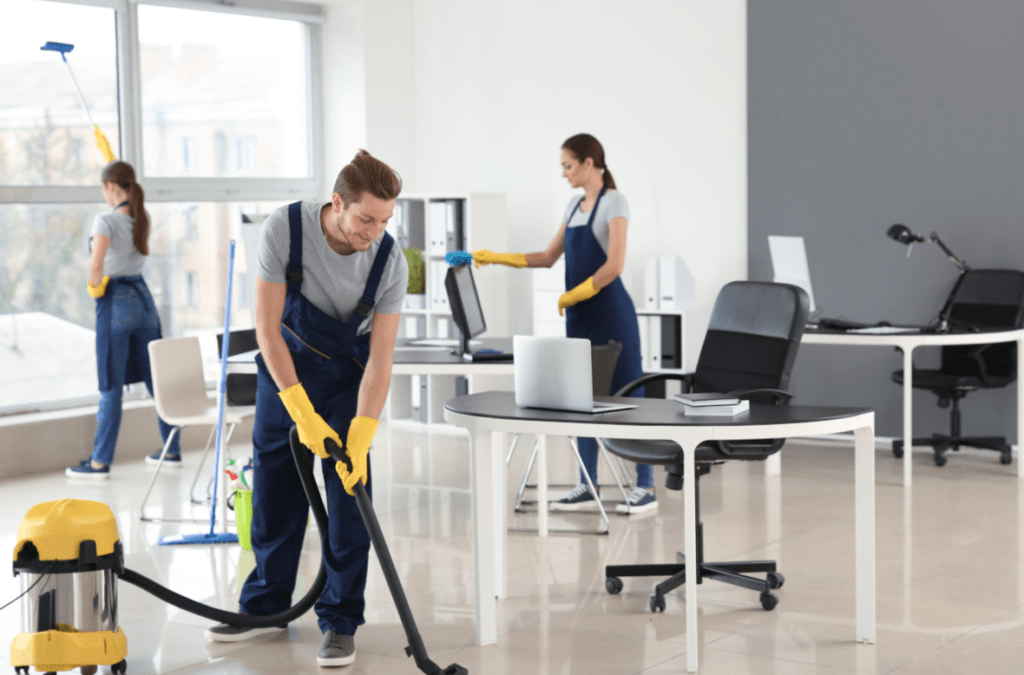Key Takeaways
- Regular office cleaning promotes a healthier work environment by reducing the spread of illness.
- Clean and organized spaces boost employee productivity and creativity.
- Maintaining a clean office reflects a company’s image positively and can lead to financial savings.
- Incorporating eco-friendly cleaning practices aligns with modern sustainability goals.
- An effective cleaning strategy should include employee engagement and respect for their work time.
- Success in office cleaning efforts can be measured through employee satisfaction and a decrease in sick days.
The Connection Between Office Cleanliness and Employee Health
The impact of office cleanliness on employee health is undeniable. A meticulously maintained workspace can significantly decrease the presence of allergens, bacteria, and viruses, directly reducing the number of sick days taken by the staff. These initiatives prevent the transmission of common diseases and improve overall air quality, pivotal for employees suffering from respiratory conditions.
Productivity and the Psychology of Clean Spaces
Maintaining a clean and organized workspace is extremely important for optimal mental performance. Disorder and chaos in the visual environment can negatively affect cognitive function, while a clean and organized office can enhance mental abilities such as memory and concentration. This is where professional commercial cleaning services come in. Ensuring your office is clean and organized can create an environment that promotes efficiency, attention to detail, and a positive work culture. Studies have suggested that individuals working in tidy spaces are more productive, less stressed, and less tired than those in disorderly environments.
First Impressions: Cleanliness and Corporate Image
Office cleaning is a crucial aspect of maintaining a professional and welcoming workspace. Clients and stakeholders visiting an office often have their first impression influenced by the state of the premises. A clean office communicates efficiency, professionalism, and pride in the business. Office cleaning is essential to ensure a clean and well-maintained workspace, which can directly affect a potential client’s decision to do business or an applicant’s desire to join the company. The corporate reputation that stems from a well-maintained workspace thus becomes invaluable in building trust and credibility with customers and within the industry.
Cost-Saving Benefits of Regular Cleanliness Maintenance
Regarding the financial benefits of regular cleaning, there’s more to it than meets the eye. Beyond the apparent sanitation and cosmetic improvements, a systematic approach to office care protects assets, such as carpets and office equipment, from premature wear and tear. This preemptive measure circumvents substantial repair or replacement costs down the line. It can be seen as an investment in the company’s infrastructure, ensuring the working environment remains healthy, appealing, and economically efficient.
Employee Contentment and Workplace Cleanliness
The mental effects of a clean environment extend to employee contentment and retention. A study found that 94% of workers report feeling more productive in a clean workspace, and 77% feel happier. Cleanliness in the office is often directly correlated with staff engagement and morale, turning cleaning from a chore into a strategic element in fostering a positive and vibrant company culture. An environment that employees take pride in can lead to improved loyalty and a sense of belonging—a critical factor in retaining top talent.
Eco-friendly Cleaning Practices and Their Role in Sustainability
Today’s businesses are increasingly conscious of their environmental footprint, and office cleaning routines are no exception. Eco-friendly strategies, such as using green cleaning products and reducing waste, help minimize the negative impact on the environment. This conscientious approach resonates well with customers and employees who value sustainability.
Implementing an Effective Office Cleaning Strategy
Creating and executing a successful cleaning strategy requires balance and consideration of the unique dynamics of each office. This may involve deciding between employing an in-house team or outsourcing to professional cleaners. The frequency and extent of cleaning tasks should be carefully planned to avoid disrupting the workflow. Beyond logistical considerations, engaging employees in maintaining their personal spaces and communal areas reinforces the importance of cleanliness, instilling ownership and responsibility across the workforce.
Dealing with the Challenges of Office Deep Cleaning
Despite regular maintenance, certain areas require occasional deep cleaning to address build-up that daily routines might overlook. Specialized tasks such as cleaning deep carpets or sanitizing high-touch surfaces require particular skills and equipment. These efforts can present logistical challenges, requiring careful scheduling to avoid office downtime. The goal of a deep clean goes beyond surface aesthetics; it’s about creating an environment that supports health and efficiency, removing deep-seated dirt and grime that can influence workplace quality.
Maintaining Cleanliness While Reducing Disturbances During Work Hours
Cleaning activities must be planned to minimize disruption to maintain uninterrupted productivity. Techniques like touchpoint cleaning, dividing large tasks into smaller ones, and scheduling extensive cleaning for off-peak hours can help. Some businesses also promote clean-desk policies, encouraging employees to tidy their workspaces and reinforcing daily maintenance without interfering with core business activities.
Measuring the Success of Your Office Cleaning Initiatives
Effective cleanliness initiatives should be regularly reviewed and measured. Quantitative data, such as decreased absenteeism due to illness, provide tangible proof of a cleaning program’s efficacy. Qualitative feedback from employee surveys can offer insights into the perceived benefits of the cleaning regimen. This feedback loop is essential for refining the strategy over time to ensure that it continues to meet the organization’s and its employees’ evolving needs.



